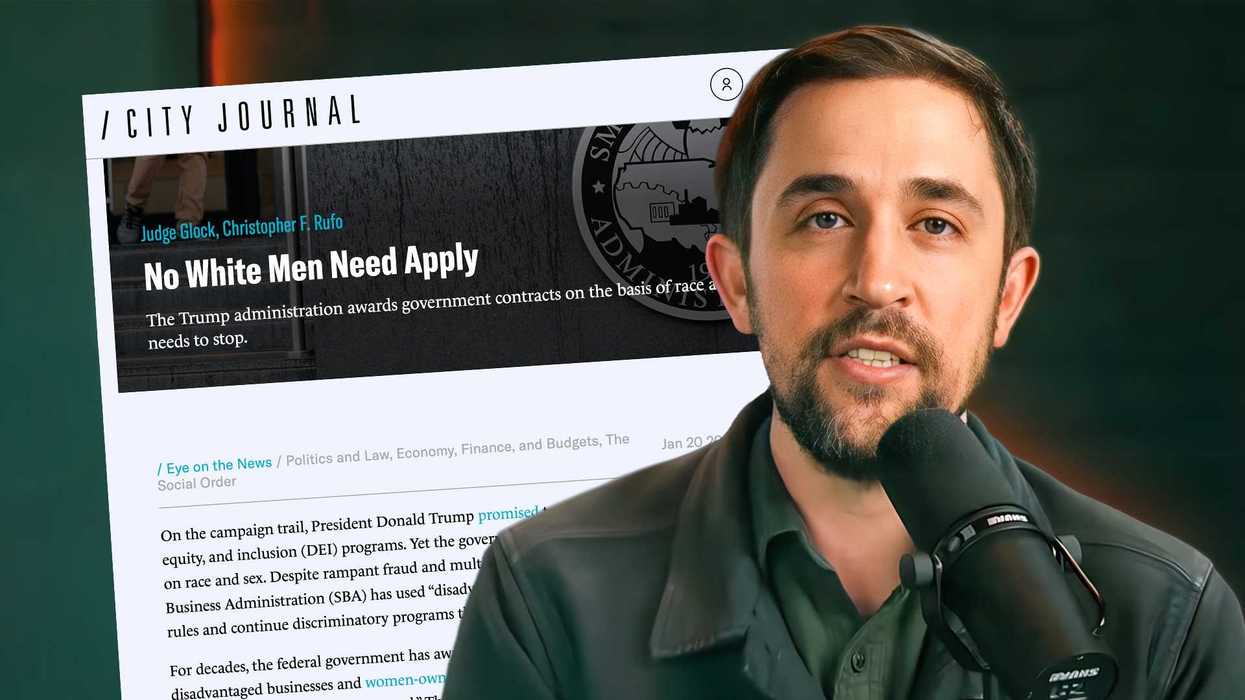
© 2026 Blaze Media LLC. All rights reserved.
No Amendment is Absolute': Chuck Schumer Complains About the First Amendment on Senate Floor
July 17, 2012
"And certain limits on First Amendment rights that if left unfettered, destroy the equality — any semblance of equality in our democracy — of course would be allowed by the Constitution."
Chuck Schumer is the last person in the United States Senate who you would expect to denounce the first amendment, especially considering the length his speeches usually get to. However, that's exactly what Mr. Schumer did today, taking to the Senate floor to support the draconian campaign finance law known as the DISCLOSE Act with a speech that included the following very odd statement:
Here's the transcript of Schumer's remarks, from RealClearPolitics:
SEN. Chuck Schumer (D-NY) on the DISCLOSE Act: "I believe there ought to be limits because the First Amendment is not absolute. No amendment is absolute. You can’t scream ‘fire’ falsely in a crowded theater. We have libel laws. We have anti-pornography laws. All of those are limits on the First Amendment. Well, what could be more important than the wellspring of our democracy? And certain limits on First Amendment rights that if left unfettered, destroy the equality — any semblance of equality in our democracy — of course would be allowed by the Constitution.""And the new theorists on the Supreme Court who don’t believe that, I am not sure where their motivation comes from, but they are just so wrong. They are just so wrong."
Now, let's parse some of this, because Schumer is disguising a non sequitur as an argument. And as it happens, he gets only one thing right in this speech - namely, that there are limits on the First Amendment. Justices from Antonin Scalia on backwards have all accepted that the Founders never meant for that concept to be applied with absolute force, though there is also the matter that the Founders expected states to decide what forms of speech were and weren't acceptable, not the Federal government. However, it is still technically true that the exceptions Schumer describes exist.
But are they actually part of the Constitution, or were they intended? Debatable. Anti-obscenity laws (the "anti-pornography laws" to which Schumer refers) have yet to be litigated before the Supreme Court at the Federal level, and the same goes for defamation ("libel") laws, which are also enforced on a state-by-state basis. So those two exceptions don't particularly help Schumer's case for campaign finance, because they would have been irrelevant to the Founders' concept of Federal power, and don't implicate questions of Federal power even today.
But what about the "fire in a crowded theater" exception? Technically, that does refer to a question of Federal power, but once you hear what that Federal power is, you'll wish it didn't. The example of yelling fire in a crowded theater was first invoked by Supreme Court justice Oliver Wendell Holmes in the 1917 case Schenck v. U.S., in a case questioning whether the Federal government could enforce a piece of legislation called the "Anti-Espionage Act" against a socialist agitator named Charles Schenck.
However, Schenck wasn't today's variety of socialist. In fact, he was arguing for something rather akin to what Tea Partiers might be seen as doing by the extreme Left today - that is, asserting one's rights against an oppressive Federal mandate. That mandate, in this case, was the wartime draft of World War I, instituted by (who else) President Woodrow Wilson. Naturally enough, Wilson's government didn't take kindly to Schenck distributing pamphlets urging citizens to resist the draft, and so they had him arrested. Schenck cried foul and appealed to the Court. This was where Holmes, one of the Court's noted progressives, came in, writing:
The most stringent protection of free speech would not protect a man in falsely shouting fire in a theatre and causing a panic. [...] The question in every case is whether the words used are used in such circumstances and are of such a nature as to create a clear and present danger that they will bring about the substantive evils that Congress has a right to prevent.
Now, not only was this standard nowhere in the Constitution, but Holmes didn't do a particularly strong job of tying the idea of yelling fire in a crowded theater as a First Amendment exception to the idea that speaking against the government in wartime is equivalent. Nevertheless, Holmes was joined in this opinion by the rest of the Court, and so far, this remains the only exception ever granted to the Federal Government regarding when it can step on the First Amendment.
So does Schumer have a leg to stand on comparing this to campaign finance? Definitely not. Not only is he reaching to an insane degree when complaining that "equality" and "democracy" are destroyed by corporate money, but he's bringing up concerns that never motivated the Founders when they drafted the document. There was no concern on the part of the Founders that people exercise their First Amendment Rights to an equal degree, nor that everyone should even have equal political rights. In fact, this last part is especially true since, as we have repeated ad nauseam, America was never intended to be a democracy, and property owners were originally the only people who could vote.
Which, come to think of it, sounds rather like Schumer's nightmare dystopia where those with the most property have the loudest voice. Some might consider it highly revealing when a leader of a major political party does not wish to abide by the political system originally envisioned by his country's Founding Fathers, but as for us, we couldn't possibly comment.
Want to leave a tip?
We answer to you. Help keep our content free of advertisers and big tech censorship by leaving a tip today.
Want to join the conversation?
Already a subscriber?
more stories
Sign up for the Blaze newsletter
By signing up, you agree to our Privacy Policy and Terms of Use, and agree to receive content that may sometimes include advertisements. You may opt out at any time.
Related Content
© 2026 Blaze Media LLC. All rights reserved.
Get the stories that matter most delivered directly to your inbox.
By signing up, you agree to our Privacy Policy and Terms of Use, and agree to receive content that may sometimes include advertisements. You may opt out at any time.






